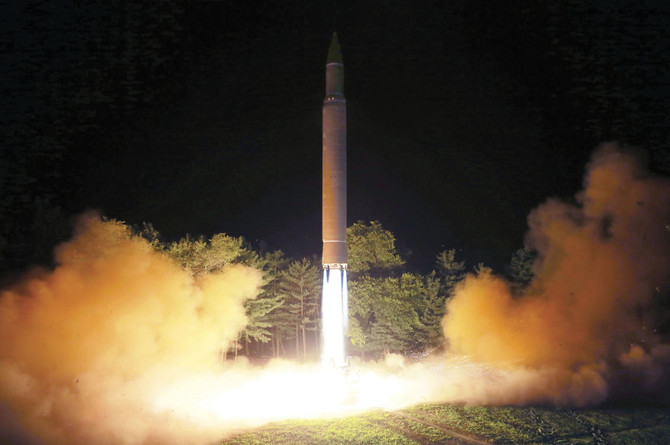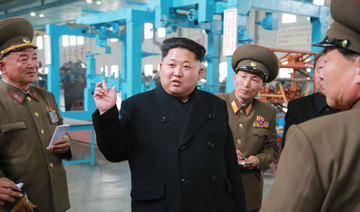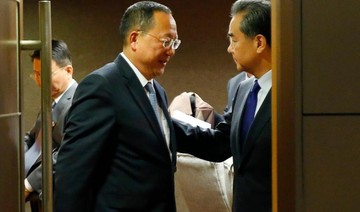MANILA: North Korea on Monday angrily insisted tough new United Nations sanctions would not stop it from developing its nuclear arsenal, and warned it would not negotiate while being threatened by the United States.
The message of defiance was the first major response to the US-drafted sanctions that the UN Security Council unanimously approved over the weekend that could cost North Korea $1 billion a year while restricting crucial economic links with China.
The sanctions were a “violent violation of our sovereignty,” Pyongyang said in a statement carried by its official Korea Central News Agency.
“We will not put our self-defensive nuclear deterrent on the negotiating table” while it faced threats from Washington, it said, “and will never take a single step back from strengthening our nuclear might.”
North Korea threatened to make the United States “pay the price for its crime... thousands of times.”
The statement came as North Korea’s Foreign Minister Ri Yong-Ho was in the Philippine capital of Manila for a security forum with the top diplomats from the United States, China, Russia and other Asia-Pacific nations.
US Secretary of State Rex Tillerson on Monday ruled out a quick return to dialogue with North Korea, saying the new sanctions showed the world had run out of patience with Pyongyang’s nuclear weapons ambitions.
Speaking to reporters at the forum, Tillerson said Washington would only consider talks if Pyongyang halted its ballistic missile program.
“The best signal that North Korea could send that they’re prepared to talk would be to stop these missile launches,” he said.
Tillerson held out the prospect of US envoys at some point sitting down with Pyongyang’s isolated regime and avoiding war, although he refused to say how long the North might have to refrain from testing more long-range missiles.
“I’m not going to give someone a specific number of days or weeks. This is really about the spirit of these talks,” he said.
The sanctions were in response to the North conducting its first two intercontinental ballistic missile tests last month that Kim boasted showed he could strike any part of the United States.
Tillerson’s remarks followed a rare exchange on Sunday between Ri and his South Korean counterpart, Kang Kyung-Wha, at a dinner to welcome all the foreign ministers.
Kang urged Ri to accept Seoul’s offers of military talks to lower tensions on the divided peninsula and for discussions on a new round of reunions for divided families, according to South Korea’s Yonhap news agency.
But Yonhap reported that Ri retorted: “Given the current situation in which the South collaborates with the US to heap pressure on the North, such proposals lacked sincerity.”
US President Donald Trump and his South Korean counterpart, Moon Jae-In, spoke on the phone on Sunday and agreed the North “poses a grave and growing direct threat,” according to a White House statement.
Trump later took to social media to hail the vote, thanking Russia and China in a Twitter post for backing the sanctions that either could have halted with their UN veto.
Trump said he was “very happy and impressed with 15-0 United Nations vote on North Korea sanctions.”
Tillerson, who held separate talks in Manila with foreign ministers Wang Yi of China and Sergei Lavrov of Russia on Sunday, also sought to emphasize a united stance against the North.
“It’s quite clear in terms of there being no daylight between the international community as to the expectation that North Korea will take steps to achieve all of my objectives, which is a denuclearised Korean peninsula,” he said.
In pointed criticism of Beijing and Moscow, Pyongyang’s fiery statement said other nations that “received appreciation from the US” for supporting the resolution would also be “held accountable for escalating tension on the peninsula.”
Washington has recently stepped up pressure on Beijing to rein in its unpredictable neighbor, which relies heavily on China for aid and trade.
Signalling that differences remained between the world powers on how to handle the North, Wang on Sunday reiterated China’s position that sanctions alone would not solve the problem and called again for the US to talk to the North.
North Korea defiant after new sanctions, rejects talks
North Korea defiant after new sanctions, rejects talks

Norway PM worried by Musk involvement in politics outside US

“I find it worrying that a man with enormous access to social media and huge economic resources involves himself so directly in the internal affairs of other countries,” Stoere told Norwegian public broadcaster NRK.
“This is not the way things should be between democracies and allies,” he added.
If Musk were to involve himself in Norwegian politics, the country’s politicians should collectively distance themselves from such efforts, Stoere said.
Russia says captured key town in eastern Ukraine

MOSCOW: Russian forces have captured the town of Kurakhove in eastern Ukraine, Russia’s defense ministry said on Monday, in a key advance after months of steady gains in the area.
Russian units “have fully liberated the town of Kurakhove — the biggest settlement in southwestern Donbas,” the ministry said on Telegram.
Canada PM Trudeau to announce resignation as early as Monday – reports

- Unclear whether Trudeau will leave immediately or stay on as PM until new leader is selected, says report
- Polls show Liberals will badly lose to the Conservatives in an election that must be held by late October
Canadian Prime Minister Justin Trudeau is expected to announce as early as Monday that he will resign as Liberal Party Leader, The Globe and Mail reported on Sunday, citing three sources.
The sources told the Globe and Mail that they don’t know definitely when Trudeau will announce his plans to leave but said they expect it will happen before a key national caucus meeting on Wednesday.
The Canadian prime minister’s office did not immediately respond to a request for comment outside regular business hours.
It remains unclear whether Trudeau will leave immediately or stay on as prime minister until a new leader is selected, the report added.
Trudeau took over as Liberal leader in 2013 when the party was in deep trouble and had been reduced to third place in the House of Commons for the first time.
Trudeau’s departure would leave the party without a permanent head at a time when polls show the Liberals will badly lose to the Conservatives in an election that must be held by late October.
His resignation is likely to spur fresh calls for a quick election to put in place a government able to deal with the administration of President-elect Donald Trump for the next four years.
The prime minister has discussed with Finance Minister Dominic LeBlanc whether he would be willing to step in as interim leader and prime minister, one source told the newspaper, adding that this would be unworkable if LeBlanc plans to run for the leadership.
South Korea’s military says North Korea fired missile into eastern sea

- The South’s Joint Chiefs of Staff said the missile was fired from an area near Pyongyang
- Seoul denounces the launch as a provocation that poses a serious threat on the Korean Peninsula
SEOUL: North Korea on Monday fired a ballistic missile that flew 1,100 kilometers before landing in waters between the Korean Peninsula and Japan, South Korea’s military said, extending its heightened weapons testing activities into 2025 weeks before Donald Trump returns as US president.
The South’s Joint Chiefs of Staff said the missile was fired from an area near the North Korean capital of Pyongyang and that the launch preparations were detected in advance by the US and South Korean militaries. It denounced the launch as a provocation that poses a serious threat to peace and stability on the Korean Peninsula.
The joint chiefs said the military was strengthening its surveillance and defense posture in preparation for possible additional launches and sharing information on the missile with the United States and Japan.
The launch came as US Secretary of State Antony Blinken was visiting Seoul for talks with South Korean allies over the North Korean nuclear threat and other issues.
Blinken’s visit comes amid political turmoil in South Korea following President Yoon Suk Yeol’s short-lived martial law decree and subsequent impeachment by parliament last month, which experts say puts the country at a disadvantage in getting a steady footing with Trump ahead of his return to the White House.
In a year-end political conference, North Korean leader Kim Jong Un vowed to implement the “toughest” anti-US policy and criticized the Biden administration’s efforts to strengthen security cooperation with Seoul and Tokyo, which he described as a “nuclear military bloc for aggression.”
North Korean state media did not specify Kim’s policy plans or mention any specific comments about Trump. During his first term, Trump met Kim three times for talks on the North’s nuclear program.
Many experts, however, say a quick resumption of Kim-Trump summitry is unlikely as Trump would first focus on conflicts in Ukraine and the Middle East. North Korea’s support for Russia’s war against Ukraine also poses a challenge to efforts to revive diplomacy, experts say.
Before his presidency faltered over the ill-conceived power grab, Yoon worked closely with US President Joe Biden to expand joint military exercises, update nuclear deterrence strategies and strengthen trilateral security cooperation with Tokyo.
Indonesia launches free meals program to feed children and pregnant women to fight stunting

- Many children are malnourished and promise is to provide free school lunches and milk as part of a longer-term strategy to achieve a “Golden Indonesia” generati
JAKARTA: Indonesia’s new government started an ambitious $28 million project Monday to feed nearly 90 million children and pregnant women to fight malnutrition and stunting although critics question whether the nationwide program is affordable.
The Free Nutritious Meal program delivers on a campaign promise by President Prabowo Subianto, who was elected last year to lead the nation of more than 282 million people and Southeast Asia’s largest economy. He said the program aimed to fight the stunting of growth that afflicts of 21.5 percent of Indonesian children younger than 5 and would raise the earnings of farmers and the value of their harvest.
Subianto has pledged to accelerate GDP growth to 8 percent from 5 percent now.
In his inauguration speech in October, Subianto said many children are malnourished and his promise to provide free school lunches and milk to 83 million students at more than 400,000 schools across the country is part of a longer-term strategy to develop the nation’s human resources to achieve a “Golden Indonesia” generation by 2045.
“Too many of our brothers and sisters are below the poverty line, too many of our children go to school without breakfast and do not have clothes for school,” Subianto said.
Subianto’s signature program, which had included free milk, could cost upward of 450 trillion rupiah ($28 billion). He said his team had made the calculations to run such a program, and “We are capable,” he asserted.
The government’s target is to reach 19.47 million schoolchildren and pregnant women in 2025 with a budget of 71 trillion rupiah ($4.3 billion) so as to keep the annual deficit under a legislated ceiling of 3 percent of GDP, said Dadan Hindayana, the head of the newly formed National Nutrition Agency.
Hindayana said the money would buy an estimated 6.7 million tons of rice, 1.2 million tons of chicken, 500,000 tons of beef, 1 million tons of fish, vegetable and fruit, and 4 million kiloliters of milk, and at least 5,000 kitchens would be set up across the country.
On Monday, a truck carrying about 3,000 meal portions arrived before lunch at SD Cilangkap 08, a primary school in the Jakarta satellite city of Depok. The 740 students were provided plates containing rice, stir-fried vegetables, tempeh, stir-fried chicken and oranges.
“We send a team to each school to facilitate the meal distribution to students every day,” Hindayana said, adding that the program will provide one meal per day for each student from early childhood education to senior high school levels, covering a third of the daily caloric needs for children, with the government providing the meals at no cost to recipients.
But the populist program has drawn criticism from investors and analysts, ranging from conflation with the interests of industrial lobby groups or the sheer scale of the logistics required, to the burden on Indonesia’s state finances and economy.
Economic researcher from the Center of Economic and Law Studies, Nailul Huda, said with Indonesia’s tight fiscal condition, state finances are not strong enough to support the fiscal burden and this will lead to additional state debt.
“That is not comparable to the effect of free meals program which can also be misdirected,” Huda said, “The burden on our state budget is too heavy if it is forced to reach 100 percent of the target recipients, and it will be difficult for Prabowo’s government to achieve the economic growth target of 8 percent.”
He warned it could also worsen the external balance of payments for the country, which is already a major importer of rice, wheat, soybeans, beef and dairy products.
But Reni Suwarso, the director of Institute for Democracy, Security and Strategic Studies said the stunting rate in Indonesia is still far from the target of a 14 percent reduction in 2024.
According to the 2023 Indonesian Health Survey, the national stunting prevalence was 21.5 percent, down around 0.8 percent compared to the previous year. The United Nations Children’s Fund or UNICEF estimated one in 12 Indonesian children younger than 5 are wasted while one in five are stunted.
Wasting refers to low weight for the child’s height, while stunting refers to low height for the child’s age. Both conditions are caused by malnourishment.
“That’s so bad and must be solved!” Suwarso said, “Child malnourishment have severe consequences, threatening the health and long-term development of infants and young children throughout this nation.”













